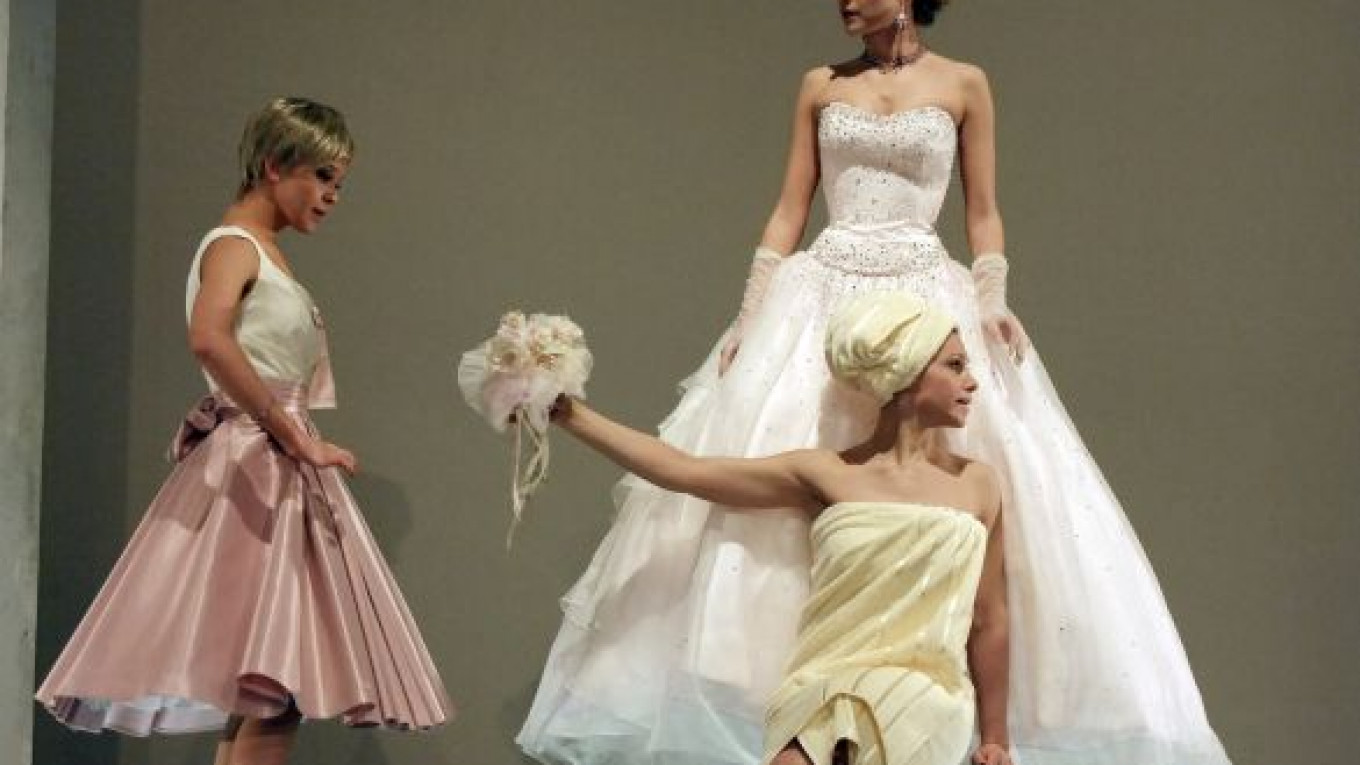Yevgeny Pisarev’s production of Shakespeare’s “Much Ado About Nothing” at the Pushkin Theater is a big, colorful, ambitious production that is geared to please. It is Pisarev’s first major effort there since taking over as artistic director following the death of Roman Kozak last May.
The attractive large set by Zinovy Margolin utilizes lots of open space and transforms into several configurations thanks to sliding panels that imply an enclosed platform at a train station or windowed walls on a large patio. The costumes by Viktoria Sevryukova are rich, varied and occasionally dashed with humor through color. A live musical ensemble, Group W, often accompanies the action, performing on raised platforms at the back of the stage.
The action, as well as the sensibilities of the characters, has been moved more or less to contemporary times. In Pisarev’s version, Don Pedro (Andrei Sokolov) and his cohorts stop in to pay a visit to Leonato (Andrei Zavodyuk), the governor of Messina, apparently on their way home from battle duty in, say, Afghanistan. They are fully outfitted in contemporary military khakis.
The main turns of the plot revolve around Leonato’s demure daughter Hero (Anna Begunova) and his hot-blooded niece Beatrice (Alexandra Ursulyak). They are the object of attention of many a man, but Don Pedro’s adjutants Claudio (Vladimir Zherebtsov) and Benedick (Alexander Arsentyev) especially have eyes for them. Benedick and Beatrice are longtime acquaintances whose relationship is characterized by constant conflict and aggressive teasing. Claudio and Hero are more the starry-eyed types, romantic and sweet.
Lest life run too easy a course, however, the nasty figure of Don Pedro’s half-brother Don John (Anton Feoktistov) lurks in the shadows with the goal of ruining Claudio and Hero’s happiness. He contrives to make it seem as though Hero has received a mysterious lover on the eve of her wedding, and there now is hell to pay for all.
These are the typical Shakespearean hooks — evil-doers, jealous lovers, mistaken identities, hard-headed men and women making fools of themselves before making up and falling in love.
Pisarev puffs things up even more, using plot twists as grandiose turning points. The result for much of the show’s first half is a production style that looks precariously close to your average over-bloated television sitcom.
This is particularly evident during a party that Leonato throws for Don Pedro and his visiting entourage. It is full of glitzy directorial tricks and knee-jerk references to pop culture. The revelers are dressed like Hollywood action figures — Robocop, the Mummy, Chewbacca and others — while Group W pumps out a tenuous pop-jazz style of musical accompaniment.
Something about all of this tries too hard — too hard to be familiar, too hard to be entertaining and too hard to please. In fact, all this noisy business undermines the tale’s human qualities. The show picks up speed when individuals are allowed to step forward and have quiet moments in the spotlight.
Arsentyev’s Benedick is particularly charming when, one night, he is purposefully made to overhear his comrades gossiping about how Beatrice is madly in love with him. Caught in his underwear, cowering behind furniture and walls as he tries to catch every word being said, he is funny, vulnerable and attractive all at once.
The mirror-image of this scene, when Beatrice’s girlfriends tell tall tales about how Benedick is lovesick for her, is equally as funny and endearing.
This show’s most successful moments concern this pair. Over the course of the evening Arsentyev and Ursulyak both succeed in breaking out of the cliches of their characters and situations.
That is confirmed with a beautiful scene staged by Pisarev right at the front of the stage. The two actors sit with legs dangling over the edge, billing and cooing and staring into each other’s eyes, as well as into the eyes of spectators sitting less than a meter away from them, as they play a straight, affecting love tryst.
It is a fool-proof coup that is good enough to make you forget much of the inflated nonsense that precedes it.
Much of this “Much Ado About Nothing” goes nowhere fast. At one point as I was still waiting for something of interest and importance to happen, I looked at my watch and found that an hour and 20 minutes had already passed. And yet, with Ursulyak and Arsentyev leading the way, a story about people who seem to matter does emerge and is strong enough to capture the imagination.
“Much Ado About Nothing” (Mnogo Shuma Iz Nichego) plays May 19 and 20 at 7 p.m. at the Pushkin Theater, located at 23 Tverskoi Bulvar. Metro Pushkinskaya. Tel. 694-1289, www.teatrpushkin.ru. Running time: 2 hours, 50 minutes.
A Message from The Moscow Times:
Dear readers,
We are facing unprecedented challenges. Russia's Prosecutor General's Office has designated The Moscow Times as an "undesirable" organization, criminalizing our work and putting our staff at risk of prosecution. This follows our earlier unjust labeling as a "foreign agent."
These actions are direct attempts to silence independent journalism in Russia. The authorities claim our work "discredits the decisions of the Russian leadership." We see things differently: we strive to provide accurate, unbiased reporting on Russia.
We, the journalists of The Moscow Times, refuse to be silenced. But to continue our work, we need your help.
Your support, no matter how small, makes a world of difference. If you can, please support us monthly starting from just $2. It's quick to set up, and every contribution makes a significant impact.
By supporting The Moscow Times, you're defending open, independent journalism in the face of repression. Thank you for standing with us.
Remind me later.







